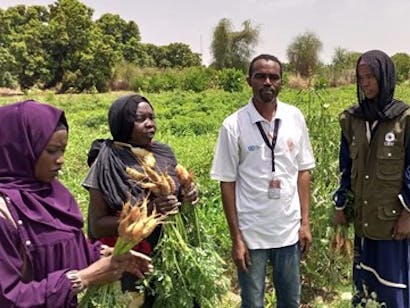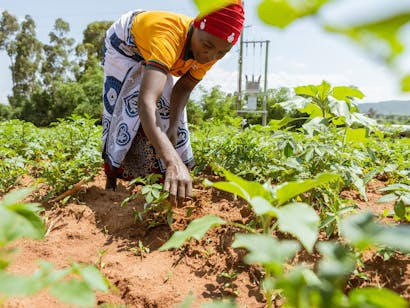Water: Not just an environmental issue
Increasing resilience by empowering people to take their lives in their own hands is a core part of CARE’s global work. For example, in our Partners for Resilience programme in Uganda we focus on the role of women in wetlands and water governance, and how this role can contribute to peace and security. To highlight this connection, Partners for Resilience organized a Water Talk at the European Development Days in Brussels to answer the question: ‘Why do the connections between women, water and wetlands matter for peace and security?’.

Wetlands cover a small percentage of the earth’s surface; they are critical infrastructures that regulate and provide water to society and are of direct relevance to sustain livelihoods. However, water resources and wetlands are rapidly depleting. This is exacerbated by the impacts of climate change which have dramatic consequences such as increased drought, loss of livelihoods, involuntary migration, and conflicts. Climate change disproportionately impacts women and girls, but when provided with the right resources, women can be key agents of change within their families and wider communities.
Women & Wetlands
In many developing countries, good management of wetlands is crucial for women, who tend to collect water for the home. Women play a central role at both the micro and household level, where women are the primary care takers and responsible for feeding the family, and at the macro level, where increasing tension over water can lead to conflict between communities and countries.
Kahokya wetland – Uganda
During CARE’s session, Annet, from CARE Uganda, led a discussion on the Kahokya wetland in Uganda, where over 30,000 people depend on the wetland as a source of water and other livelihoods. In general, wetlands have many different functions: from beekeeping and firewood for domestic use, as a source of water for livestock and domestic use, and to mitigate climate conditions. Moreover, participatory wetland management can strengthen women’s participation and recognizes their role in the wetland governance structure. Additionally, when more water is available through wetlands, women’s productivity can increase which positively affects food security in the region. Improved access to water also positively affects women’s health and girls’ participation in education, given they spend less time collecting water.
The relation between water and conflict
Water is an issue of international security and stability. Exacerbated by climate change, water scarcity can also lead to conflict, both within countries (for example, between pastoralists and farmers) as well as between countries (for example, around the Nile). Women are often hit hardest by water-related problems, but they are also key in driving change. As Carmen Ruiz (EEAS) mentioned during the session, “If women are involved in defusing conflicts, peace will be more sustainable and peace solutions will last longer.”
Not only an environmental issue
It is clear that water is not just an environmental issue, a women’s issue or a development issue. Water is an important topic that connects a range of issues at different levels, all of which have significant consequences, particularly for women. Our session during the European Development Days was an excellent moment to highlight the topic and the crucial role that women can play in addressing these injustices.
By Tess van Bommel & Bart Weijs, CARE Nederland
This blog was based on the session ‘WATERTALK: Women, Water and Wetlands’, organized by Wetlands International and Partner for Resilience, during the 12th European Development Days in Brussels, Belgium (June 5-6).


